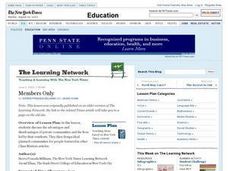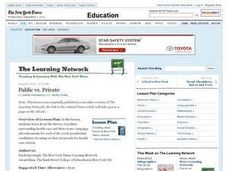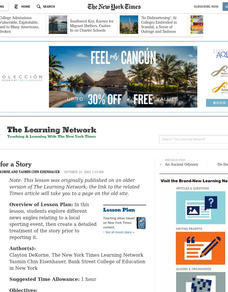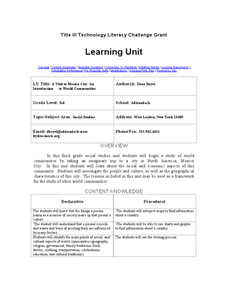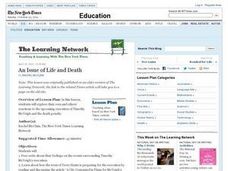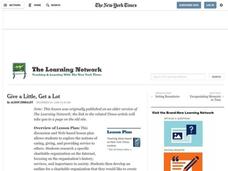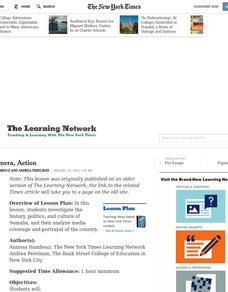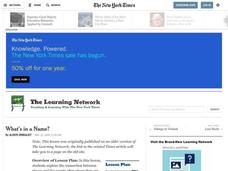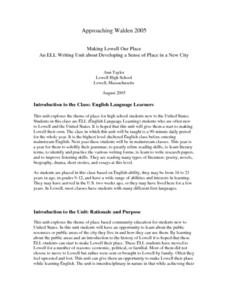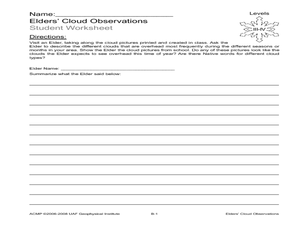Curated OER
2002: The Year In Review
Young scholars research and create a book highlighting significant events and trends throughout the world in the year 2002. Then, through creative writing, they respond to the events or trends themselves and how they affected our world.
Curated OER
Connecting Immigrants In Black And White
Students explore the many ways that ethnic newspapers help immigrants in the United States stay connected to their cultures and countries of origin. They write articles for ethnic newspapers.
Curated OER
Members Only
Students discuss the advantages and disadvantages of private communities and the lives led by their residents. They design ideal planned communities for people featured in other Class Matters articles.
Curated OER
Our Town
Students read and discuss an online article as they consider what makes a center of activity in a city or town. They produce a documentary film of the hub of activity in their school.
Curated OER
Public vs. Private
Students watch two commericals from previous presidential elections on the topic of healthcare. After reading an article, they identify the position of the various candidates for the 2008 election. In groups, they brainstorm their own...
Curated OER
For Public Display
Learners compare three works of art to understand how juxtaposition can express a point of view. They brainstorm topics of interest to them and their respective communities that could act as a springboard for curating individual exhibits...
Curated OER
Angling for a Story
Young scholars explore different news angles relating to a local sporting event, then create a detailed treatment of the story prior to reporting it.
Curated OER
The Roots of American Culture
Students explore the notion of culture and the influence of Latino culture on the U.S. They work in small groups to identify ways that Latino and non-Latino U.S. cultures have engaged in cultural 'cross-fertilization.'
Curated OER
A Visit to Mexico City: An Introduction to World Communities
Third graders complete a variety of activities as they take an imaginary trip to Mexico City, complete with passports, maps, and Spanish dictionaries. They write postcards to send home and create items to sell at the market. The unit...
Curated OER
An Issue of Life and Death
Students explore the reaction to the execution of Timothy McVeigh. They discuss the event, interview others concerning the death penalty, and write an article on reactions to the execution of Timothy McVeigh.
Curated OER
Write Away
Students examine the effect of computers and other word processing programs have had on traditional forms of communication and expression after reading and discussing the article "Where the Pen is Mightier Than the PC" from The New York...
Curated OER
It's How You Play the Game
Students assess and explain the qualities that they believe are possessed by great professional athletes. They examine whether or not getting away with breaking a rule in a sport is considered cheating or gamesmanship.
Curated OER
Give a Little, Get a Lot
Students research a specific charitable organization on the Internet, focusing on the organization's history, services, and importance in society. They develop an outline for a charitable organization with a mission statement.
Curated OER
Making the Personal Political
Young scholars identify controversial topics on which they have strong opinions and model their own persuasive opinion pieces after the featured article. They compose persuasive essays on controversial issues that "hit home" for them.
Curated OER
Life, Camera, Action
Students investigate the history, politics and culture of Somalia. They analyze media coverage and portrayal of the country. They focus on the role of media in reporting on Somalia and the current debate over the film Black Hawk Down.
Curated OER
Babes in Electronic Toyland
Young scholars read a New York Times article in order to explore the use of handheld electronic devices in schools. They investigate, through surveys and essay-writing, the pros and cons of this technology.
Curated OER
Settling Down
Students investigate the Umoja shantytown in Miami, Florida as well as other shantytowns around the world in order to create a Web site bringing awareness to the issue of slum dwelling.
Curated OER
What's in a Name?
Learners explore how one uses examples from history to inform themselves of past and present events. After reading an article, they examine the significance of renaming a base in Germany after a soldier who survived the Holocaust. They...
Curated OER
Glastonbury Festival
Students read about the Glastonbury Festival and then have to plan their own summer festival. In this festival lesson plan, students fill out worksheets and create a presentation for their festival.
Curated OER
Making Lowell Our Place
High schoolers investigate a community through different types of educational experiences. They use short field trips to experience the community in real life. they also conduct research using a variety of resources. Then students build...
Curated OER
Elder's Cloud Observations
Young scholars study cloud types and Native language terms for clouds and cloud types. In this cloud types lesson plan, students listen to a Native American speaker discuss clouds and the words used to describe clouds. Young scholars...
Curated OER
Community Culture Trunk
Second graders examine the similiarities and differences between the various cultures represented in their class. After being read a story about immigration, they identify things they would have to bring with them if they were moving to...
Curated OER
Changes in the Community: Diversity of Learners Adaptation
Learners determine the rate of travel through Ohio based on mode of transportation: walking, horse bak riding, railroad, and car. They are asked to write a sentence explaining how they would determine how long each trip takes. Students...
Curated OER
Stitching Our Way Through Time to Learn About Nebraska Animals
Students study about animals that have lived in Nebraska in the past, and animals that currently live in Nebraska. They examine how animal life changed since the early beginnings and what has caused these changes?


